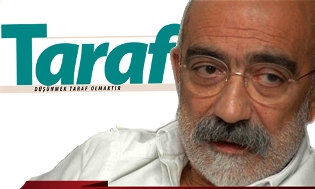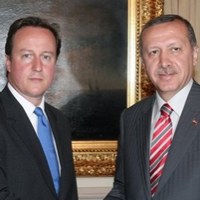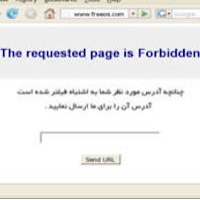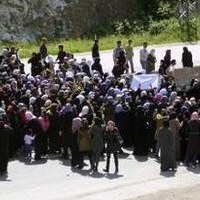![]()
Wed, Dec 19, 2012 | By Halil M. Karaveli
This article was first published in the Turkey Analyst, vol. 5 no. 24 (www.turkeyanalyst.org), a biweekly publication of the Central Asia-Caucasus Institute & Silk Road Studies Program Joint Center. © Central Asia-Caucasus Institute & Silk Road Studies Program Joint Center, 2012.
The mood among the few remaining, scattered liberal voices in the Turkish media landscape is gloomy in the wake of the resignation of Ahmet Altan, the editor-in-chief of the liberal daily Taraf, the media “sword” of the campaign that broke the power of the military. As far as the ruling Justice and Development party (AKP) is concerned, the “mission” of Taraf was accomplished when the generals were safely tucked away in prison. Altan had since become a leading, fierce critic of Prime Minister Recep Tayyip Erdoğan, and his departure from Taraf is yet another reminder that the space for critical expression in Turkey is being systematically narrowed.
Background
The Turkish daily Taraf, which has been in circulation since November 15, 2007, played a crucial role in the power struggle between the AKP and the military, from which the ruling party emerged victorious. Hundreds of active and retired military officers, including a former chief of the general staff and several force commanders have been imprisoned. The charges against these military officers are based on documents — detailing various, alleged plots to create chaos in the country with the purpose of bringing down the AKP government — that were made available to the daily Taraf. The publication by Taraf of the coup and conspiracy documents — codenamed “Sledgehammer”, “Cage” and the General staff’s alleged “Plan to finish the Gülen movement and the AKP” — contributed to bestowing legitimacy on the subsequent moves of the judiciary against the military.
As Taraf is not part of any media conglomerate controlled by business interests that are close to the ruling AKP or has any apparent connections to the powerful fraternity of the cleric Fethullah Gülen, it enjoyed credibility as an independent, liberal voice whose sole interest was to advance the cause of democracy by exposing what the military was up to. The track record of the military certainly also goes a long way in accounting for why the disclosures of Taraf were willingly taken at face value by so many.
What Taraf did not do was to subject the documents that it was served to normal, critical journalistic scrutiny; since then, the accuracy of many of the details in the alleged coup and conspiracy plans have been called into question, and Taraf has been accused by its critics of having disseminated fabricated evidence that has landed scores of innocents in prison. The editors of Taraf have addressed these charges by stating that the daily has a “mission”, implicitly suggesting that ordinary journalistic standards do not apply when there is an enemy of democracy — the military — to defeat.
Indeed, the very name Taraf (Side) is meant to signal that the publishers and editors of the daily had taken sides in what they themselves assumed was a battle for democracy. But after they had helped the AKP to defeat the military, the editors of Taraf were dismayed to discover that their calls for democratic reforms not only went unheeded by the new rulers of the country, but that they infuriated them. As far as the AKP is concerned, the “mission” of Taraf was accomplished when the generals were safely tucked away in the Silivri penitentiary near Istanbul. Having outlived its usefulness, Taraf instead became a thorn at the side of the AKP.
On December 14, the editor-in-chief Ahmet Altan and his deputy editor, Yasemin Çongar, resigned. Their resignations were followed by those of two senior editors and of a couple of columnists, including Murat Belge, a prominent liberal intellectual. In his last editorial, published on December 15, Altan made a graceful exit, declining to explain why he had now decided it was time to go back to “writing novels”. Başar Aslan, the owner of the newspaper, meanwhile opaquely referred to “differences of opinion”; however, what these differences have been about is not difficult to figure out. Altan had become an annoyingly ferocious critic of Prime Minister Erdoğan. Erdoğan filed several lawsuits against Altan, who had been sentenced to pay exorbitant fines. Recently, Altan was sentenced to a fine of 15,000 Turkish Lira (ca. US$ 8,300) for having employed insulting language against the prime minister. It is also widely assumed that the government has discouraged businessmen from buying advertisements in Taraf.
Implications
What made the editorial line of Taraf particularly annoying for Turkey’s new rulers was that it was an erstwhile ally that was calling their democratic sincerity into question. The criticism coming from Taraf was biting because it was formulated in the name of a democratization that Erdoğan himself had initially purported to stand for. Erdoğan is hardly bothered by the harsh criticism to which he is subjected, or by the occasional insults he is served, in the columns of secularist dailies; such outbursts are easily dismissed as the lamentations of losers, of the advocates of a defunct, authoritarian Kemalist system, and is in no way a threat to the AKP’s popular legitimacy. Altan, on the other hand, was a nuisance — and ultimately an intolerable one — precisely because he did not belong to that category; he was the once-allied pundit who yelled “the king is naked”, making a powerful case that Erdoğan and the AKP had betrayed the “revolution” by appropriating the ways of traditional Turkish state authoritarianism.
“How could a party that rose to power as the representative of one oppressed group in society — the religious conservatives — deny the freedom of others — Kurds, Alevis — that are similarly oppressed?” asked Altan in one editorial. Taraf fiercely criticized the AKP government not only for its refusal to grant the Kurds equality with the Turks, but also for its religious conservative drift. “How could those who endured the oppression of Kemalism, its attempt to re-mould society, appropriate the same methods, this time to impose a religious conservative blueprint on society?“ inquired Altan. In one of his last editorials, the disappointed liberal editor sounded a note of deep pessimism: “There was no obstacle on the road to democracy. But at the end of the day, this is a Middle Eastern society and Erdoğan is a Middle Eastern leader. It is almost impossible to satisfy his hunger for power.”
Indeed, the example of Taraf would seem to offer a striking case study of a liberal fallacy, of the assumption — or hope — that some version of Islamism is what holds the best promise of introducing democracy to Muslim countries. Haluk Şahin, a Turkish professor of journalism, who published an acclaimed book in 2008 about the changing face of Turkish politics — of which the alliance of liberals and Islamists was then the most remarkable aspect — presciently remarked, speaking to the Turkey Analyst, “What’s it with these liberals; do they expect that the terrain is going to be left to them once victory is secured?” Liberals like Ahmet Altan certainly succumbed to a fallacy when they put stock in Erdoğan’s promises of democratization; but the liberal intelligentsia may have assumed that the EU membership process was going to provide a check on the residual authoritarianism of the new rulers of Turkey. However it may be, the fact that Erdoğan has proven to be an autocrat does not necessarily invalidate the assumption that religious conservatives can help bring about democratization. It is possible that Ahmet Altan became intolerable precisely because the notion of a republic that respects and protects societal diversity does resonate — or at least has the potential to do so in the long run — among the new, pious middle class in Anatolia, the very audience with which Altan made a particular point of engaging in a conversation in his editorials. Indeed, Altan’s attempt to mobilize modern conservatives in favor of liberalization fitted into the emerging, ideological pattern of the challenge to Erdoğan that is mounted by the followers of Fethullah Gülen. President Abdullah Gül has similarly made a point of speaking out on behalf of liberal reform, which suggests that there is a constituency for reform among the AKP’s base to tap into.
But the mood among the few remaining, scattered liberal voices in the Turkish media landscape is gloomy; Hasan Cemal, a leading liberal, wrote that a “sense of defeat, a feeling of loneliness” had enveloped him in the wake of the resignations at Taraf. That Altan’s departure is yet another reminder that the space for critical expression in Turkey is being systematically narrowed is beyond any doubt. Some liberal commentators also fear that a coup is in the making, and have lately taken to issuing ominous warnings that Erdoğan’s authoritarianism is paving the way for the revival of a vengeful kemalism.
Conclusions
Ahmet Altan suffered the consequences of having criticized Prime Minister Erdoğan, yet he always reserved his worst vitriol for Kemal Atatürk, the first president of Turkey, for whose legacy of forced secularism and nationalism he had nothing but utter contempt. However, the self-described progressives of Turkey — whether they are liberals who call for freedom or secularists who defend “modernity” against “reactionary” religion — share a common predilection (as well as a common class background): a tendency to become fellow travelers of authoritarianism, even though Altan “saved his soul,” as one commentator put it, by turning into a resolute critic of Erdoğan when he — albeit belatedly — discovered that the prime minister was an autocrat.
The liberals have rallied to Islamists in the hope that they would bring democracy to Turkey, while the secularists trust that the military stands for “enlightenment”. That is the tragedy of Turkey’s Western-oriented middle class, and it would be a worthy theme for Ahmet Altan to explore as he retires to his chamber to write novels.
Halil M. Karaveli is Senior Fellow with the the Central Asia-Caucasus Institute & Silk Road Studies Program Joint Center and the Managing Editor of the Turkey Analyst.



 RSS
RSS













Latest Comments
Hello Mike, Thank you for your positive feedback to the article. I felt there wasn’t too much critical analysis of ...
Thanks for this considered and well constructed article. A follow up article on the manner in which the editorial contro...
THE CLUELESSNESS OF CLAIMING THAT OBAMA'S MIDDLE EAST POLICIES WERE A FAILURE CANNOT BE FURTHER FROM THE TRUTH, WHAT THE...
As long as Obama is the president of the usa do not trust the us government......
Thank you for an good read....